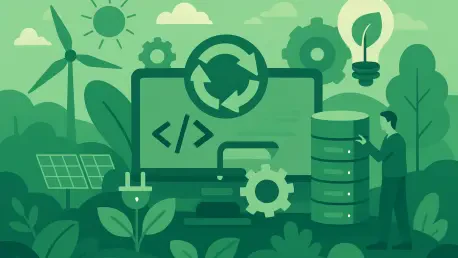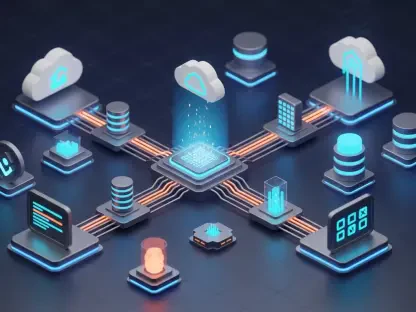In a world increasingly defined by rapid technological advancement, the environmental toll of the tech industry has emerged as a pressing concern that cannot be ignored, especially as data centers consume vast amounts of energy. With software development practices contributing to carbon emissions, the DevOps methodology—long celebrated for its emphasis on speed and efficiency through continuous integration and deployment (CI/CD)—is undergoing a significant transformation. This shift prioritizes sustainability, aligning technological innovation with the urgent need to combat climate change. Driven by regulatory pressures, stakeholder demands, and a collective responsibility to protect the planet, DevOps teams are adopting green practices that not only reduce environmental impact but also enhance operational effectiveness. This article explores how these eco-friendly strategies are reshaping the landscape of software development, proving that high performance and environmental stewardship can coexist in harmony within the industry.
The Imperative for Eco-Friendly DevOps
The tech sector’s environmental footprint has become impossible to overlook, with DevOps practices playing a central role in both the problem and the solution. Data centers, which underpin the cloud infrastructure essential to CI/CD pipelines, are notorious for their high energy consumption, often powered by non-renewable sources that drive up carbon emissions. Additionally, inefficient coding practices and the constant cycle of hardware upgrades contribute to electronic waste, compounding the ecological burden. Industry reports underscore that sustainability is no longer a peripheral issue but a core business imperative. Engineers and executives alike are recognizing that integrating green principles into DevOps workflows is essential not just for meeting global climate goals but also for maintaining competitive advantage. This growing awareness marks a turning point, pushing the industry to rethink traditional approaches and embrace strategies that prioritize the planet without compromising on speed or innovation.
This urgency is further fueled by external pressures that demand immediate action across the tech landscape. Governments worldwide are imposing stricter regulations on carbon emissions, while investors and customers increasingly favor companies with clear sustainability commitments. Within the DevOps community, this translates to a fundamental shift in mindset—moving beyond mere efficiency to consider the broader environmental impact of every deployment and update. Social media discussions among industry professionals highlight a consensus that failing to adapt to these expectations risks reputational damage and financial penalties. Moreover, aligning DevOps with green objectives offers a dual benefit: reducing ecological harm while often lowering operational costs through energy savings. This pivotal moment challenges the sector to innovate, ensuring that environmental responsibility becomes a cornerstone of software development practices rather than an afterthought.
Innovations Driving Carbon Reduction
At the heart of sustainable DevOps lies a wave of technical innovations designed to minimize energy use without sacrificing performance. One standout approach involves optimizing CI/CD pipelines by scheduling builds during off-peak energy hours, thus reducing strain on power grids and cutting consumption. Serverless architectures are also gaining traction, allowing systems to scale dynamically and use resources only when needed, which can slash energy usage by up to 30% in certain scenarios. Tools like Docker, which enable lightweight containerization, further streamline deployments by minimizing resource waste. Green coding practices are another critical focus, emphasizing the creation of algorithms that require fewer CPU cycles and the adoption of low-energy libraries. These advancements demonstrate that environmental considerations can be seamlessly integrated into the fast-paced world of DevOps, proving that efficiency and sustainability are not mutually exclusive goals.
Beyond these strategies, the adoption of renewable energy sources by major cloud providers marks a significant step forward in reducing the carbon footprint of DevOps operations. Many industry leaders are transitioning data centers to solar, wind, and other sustainable power options, setting a benchmark for smaller organizations to follow. Additionally, advancements in artificial intelligence (AI) and machine learning (ML) are being leveraged to predict and optimize resource allocation, ensuring that servers operate at peak efficiency with minimal waste. These tools analyze usage patterns to prevent over-provisioning, a common issue that drives unnecessary energy consumption. As highlighted by recent industry analyses, such innovations not only curb emissions but also enhance system reliability and scalability. The message is clear: technological progress offers powerful solutions to environmental challenges, paving the way for a greener future in software development.
Cultural Transformation in DevOps Teams
Sustainability in DevOps extends beyond technical fixes to encompass a profound cultural shift within teams and organizations. A growing trend involves embedding environmental metrics into key performance indicators (KPIs), enabling teams to monitor electricity usage in cloud environments and track e-waste generated from hardware lifecycles. This data-driven approach fosters accountability, encouraging developers to make conscious choices that align with green objectives. By prioritizing sustainability alongside traditional metrics like deployment frequency and system uptime, companies are redefining success in DevOps. Industry conversations on digital platforms reveal widespread support for this shift, with many professionals noting that greener practices often lead to more streamlined operations, reducing costs while benefiting the environment. This cultural evolution signals a broader recognition that long-term resilience depends on balancing innovation with responsibility.
Equally important is the emphasis on education and collaboration within the DevOps community to sustain this momentum. Training programs are emerging to equip developers with the knowledge to implement eco-friendly coding techniques and optimize workflows for minimal environmental impact. Cross-functional collaboration between engineering, operations, and sustainability teams ensures that green initiatives are integrated holistically rather than as isolated efforts. This collective approach also helps address the human element of sustainability, acknowledging that reducing burnout and fostering inclusive work environments are as vital as cutting emissions. As industry experts point out, a workforce empowered with the right tools and mindset can drive meaningful change, creating DevOps practices that are not only efficient and scalable but also aligned with societal values. This cultural transformation underscores that sustainability is a shared responsibility, requiring commitment at every level of an organization.
Balancing Challenges with Future Potential
Despite the strides made, integrating sustainability into DevOps is not without significant obstacles that demand innovative solutions. Emerging technologies such as blockchain and AI, while transformative, often rely on energy-intensive data centers that counteract carbon reduction efforts. The lack of universal standards for measuring and mitigating environmental impact further complicates progress, leaving organizations to navigate a patchwork of guidelines and tools. Additionally, the rapid pace of technological advancement can outstrip the adoption of green practices, creating a tension between staying competitive and staying sustainable. Industry discussions highlight concerns that without coordinated efforts and robust frameworks, the environmental benefits of sustainable DevOps risk being undermined by the very innovations meant to drive progress. Addressing these challenges requires a delicate balance, ensuring that growth does not come at the expense of the planet.
Yet, the opportunities for overcoming these hurdles are abundant, pointing to a promising horizon for sustainable DevOps. The increasing use of AI-driven automation to optimize resource usage offers a path to greater efficiency, while the shift toward renewable energy in cloud infrastructure continues to gain momentum among providers. Tools for tracking carbon emissions in CI/CD pipelines are also becoming more sophisticated, enabling teams to benchmark their impact and identify areas for improvement. Industry forecasts suggest that over the next few years, from now through 2027, eco-focused automation and standardized metrics will become integral to DevOps workflows. This forward-looking perspective emphasizes the potential for collaboration across sectors to establish best practices that reconcile technological advancement with environmental stewardship. The ongoing evolution of these strategies holds the promise of a future where DevOps not only drives innovation but also safeguards the environment for generations to come.
Reflecting on Progress and Next Steps
Looking back, the journey toward sustainable DevOps revealed a remarkable alignment of technology and environmental responsibility that reshaped industry priorities. Technical innovations like optimized CI/CD pipelines and green coding practices demonstrated that efficiency and eco-friendliness could go hand in hand, while cultural shifts embedded accountability into team dynamics. Challenges persisted, particularly with energy-heavy emerging technologies, but the adoption of renewable energy and advanced tools offered tangible solutions. As the industry took stock of these efforts, it became evident that sustainability enhanced not just ecological outcomes but also operational resilience and cost-effectiveness. This period marked a turning point, where the commitment to green practices solidified as a defining feature of modern software development, reflecting a broader societal push for conscientious innovation.
Moving forward, the focus must shift to actionable strategies that build on these foundations and address remaining gaps. Establishing universal standards for measuring carbon footprints in DevOps processes should be a priority, providing a clear framework for organizations to follow. Investment in research and development can further refine AI-driven optimizations and renewable energy integrations, ensuring scalability across diverse environments. Collaboration between tech companies, policymakers, and environmental experts will be crucial to drive systemic change, creating policies that incentivize sustainable practices. Additionally, expanding educational initiatives to train the next generation of developers in green methodologies will sustain long-term impact. These steps, grounded in the lessons of recent progress, chart a path toward a future where DevOps not only powers cutting-edge technology but also champions a healthier planet.









